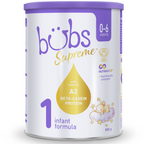Find the Right Words: Setting Boundaries Around Your Newborn
Welcoming your newborn into the world is an exciting time. The little toes! The smell! The sweet noises! It’s only natural for everyone in your life to be keen to share the joy.
But while this time is filled with excitement and love, it’s important to remember that newborn infants have developing immune systems, leaving them more vulnerable to viruses and infections – especially during winter and flu season when bugs are common.
As a parent, it’s not only okay but necessary to set boundaries that prioritise your baby’s health and safety. This includes whether or not you allow others to hold your newborn.
In this guide, we’ll share supportive and respectful ways to communicate those boundaries with your loved ones (and well-meaning strangers), so you can enjoy this special time without the added worry of newborn sickness.
Why You May Not Want Others to Hold Your Newborn
There are plenty of health reasons why you may not want other people to hold your newborn, especially in winter. One of the most important things to know about newborns is that their immune systems are immature and take time to strengthen, which means they’re far more susceptible to illnesses like the flu, RSV, the common cold and COVID-19. Symptoms and sickness that may seem mild in adults and older children can cause serious complications for newborns, sometimes requiring hospital care. Setting boundaries or telling people not to hold your baby doesn’t make you overprotective or overly cautious – you are informed and advocating for your child’s wellbeing.
How to Tell People They Can’t Hold My Baby - Politely but Firmly
Telling people not to hold your baby can be uncomfortable, but prioritising your baby’s health is what matters most. Many parents have to make the same choice, and you’re not alone. Always remember that you’re doing the right thing and your decision is an act of love for your child, not to spite others.
If you’re comfortable doing so, sending a message to family and friends to communicate your wishes before they visit allows you to avoid any in-person confrontation. It’s also a great idea to have some one-liners you can memorise and lean on, so you feel comfortable setting boundaries in the moment.
Here are some examples of polite, yet clear, ways to say “no”:
-
“I’ll be more comfortable letting other people hold bubs once their immune system is more developed.”
-
“Right now we’re focused on letting our little one get used to our touch.”
-
“Thank you for offering to hold them, but I’m not ready to let go right now.”
-
“They’re so little, we’re only letting adults hold them for now.” (directed at young children)
-
“With all the flus going around right now, we’re just being super careful for the moment.”
-
“We’re keeping baby cuddles to just us for a while, until they’re a bit bigger and stronger.”
When It’s Okay to Let Someone Hold Your Baby - Safely
If, and when, you are ready to allow someone else to hold your baby, there are some precautions you can take to ensure it’s done so safely, starting with clean hands and no signs of illness. Some families may also want to make sure any visitors have up-to-date vaccinations, particularly for whooping cough and influenza, which can pose serious newborn sickness threats.
Before passing them over, ensure the person knows the proper holding technique – using one hand to support the baby’s head and neck, while the other supports their bottom and back. You can also offer a kind reminder for no kisses or face touching to keep germs at bay.
Things You Need for a Newborn to Stay Safe This Winter
Having a few key essentials on hand for your baby’s first winter can help you feel prepared and bring you peace of mind, so you can spend more time soaking up those skin-to-skin newborn cuddles and less time worrying about germs and colds!
Here’s a quick newborn checklist of practical winter must-haves:
-
Layered warm clothing: Think soft, breathable onesies and knitted jackets.
-
Beanies and mittens: Cosy beanies and accessories will prevent heat loss from heads and hands.
-
Gentle wipes: Fragrance-free wipes are best for delicate newborn skin.
-
Nappy cream: Barrier creams are essential to protect from nappy rash.
-
Saline drops: To help clear stuffy little noses and newborn congestion.
-
Room thermometer: To know the temperature for a safe sleep environment.
-
Hand sanitiser: A baby-safe sanitiser for visitors and outings.
Remember, setting boundaries isn’t about offending others but protecting your baby while they’re at their most vulnerable. This cautious season won’t last forever (babies grow up fast!), but while you’re in it, it’s okay to prioritise your family’s health and comfort. Trust in your parenting instincts – you’re doing what’s best for your little one, and that’s all that matters. You can find more guidance on the early days of newborn life via our new parents blog, and if you’re ever concerned about your newborn’s health, don’t hesitate to reach out to your health professionals for support.


